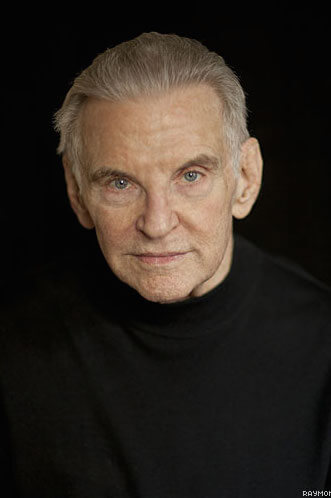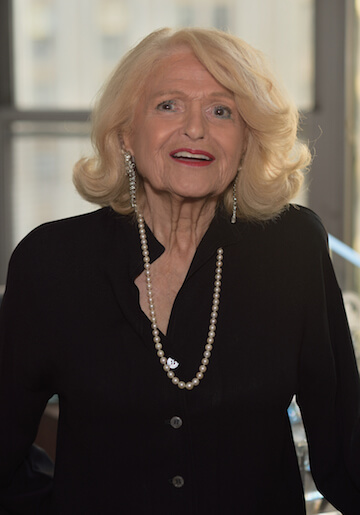The Judean prophet Jeremiah from –– yes –– the Old Testament is a fitting exemplar for the late Doug Ireland, one of the modern gay movement’s greatest seers. Jeremiah warns his people in Lamentations –– as fitting a title for speaking to today’s LGBT community as it was in addressing the misbegotten Jews when they lost their temple –– to refute idolatry and riches and return to the truth. Today, the word jeremiad is too often associated merely with predictions of doom; the more important implication of the word involves its intention to provoke.
In “The Emperor Has No Clothes: Doug Ireland’s Radical Voice,” we have Martin Duberman, the academic and author, to thank for the yeoman’s task, nearly archeological, of collecting and printing highlights from more than three decades of Ireland’s jeremiads. Strident, at times polemical, occasionally the history professor, elsewhere the political agitator, Ireland could not tolerate hypocrisy or cowardice. Duberman astutely pinpoints the animating spirit behind his life and his work: “Nothing angered Doug more than complacency in the face of deprivation.”
Having suffered as a child from polio, which created adult complications that contributed to his death at 67 in 2013, Ireland –– after a journalistic career in New York and abroad writing for publications including New York magazine and the Nation, as well international journals (he wrote in both French and English) –– spent his final years as a reporter doing his research, interviewing, and writing from his East Village apartment. Despite worsening physical disability and crushing bouts of pain, his passion for his work and his commitment to find progressive outlets, including this one, for his voice were such that he devoted hours that would have daunted a healthy man half his age to completing long, thoughtful, and deeply reported articles.'
Historian Martin Duberman restores polymath Doug Ireland’s passionate voice to a place of prominence
I’m proud to take some credit for Ireland’s long-running contribution to Gay City News. As deputy editor in 2005, I was helming an issue where late in the game, a photo surfaced online of hooded executioners fitting nooses on two young Iranian men arrested on sodomy charges moments before they were lynched from a construction crane. It was my good fortune and the newspaper’s that longtime activist friends of Ireland’s put me in touch with him, and from that beginning he contributed a long string of articles about the wave of anti-LGBT killings and repression in the Islamic Republic. Ireland also contributed important coverage on the struggle for gay rights in other troubled places in the world, including Russia and Africa, and in a series of book reviews demonstrated his remarkable mastery of queer social and cultural history.
It was Ireland’s writing about Iran that Duberman chooses to highlight in “The Emperor Has No Clothes,” and to his credit he also incorporates a critique of that work written by Scott Long (and published in Gay City News), then the head of Human Rights Watch’s LGBT desk. Ireland and Long became bitter adversaries, and Duberman does not take sides, though his intent is clear. Institutionalists may strike back at renegades who challenge them, at times at their peril.
Duberman has written plenty of books and knows best how to frame one. The first Ireland essay here is from 2009, rather late, and it is both a political treatise and a scathing critique of contemporary gay life. It starts with Karl Marx’s homophobia and ends with this statement: “Only a fundamental redefinition of human freedom that includes a recharacterization of human sexuality in all its glorious varieties — the original project of gay liberation — can do that.”
The “that” means changing hearts and minds. Ireland was all heart.
He had scant use for the “top-down, corporate structure” of the Human Rights Campaign and its rubber chicken fundraisers. The queer impetus, post-Stonewall, to remake a stifling social structure into something more akin to Whitman’s Body Electric had, to his dismay, gone off the rails, replaced by eager striving for middle class respectability and security, and the Pines saltwater swimming pool.
Despite his radical disposition, Ireland, early in his career, found great success as a New York political operative, managing winning congressional campaigns for anti-war liberals –– first, in 1969, Allard Lowenstein and, later, Bella Abzug, whose brazenness and embrace of gay rights endeared her to the LGBT community. By the time Abzug entered the crowded 1977 Democratic mayoral field, Ireland had moved on to journalism. In New York magazine, he was critical of the candidates across the board, faulting Abzug for toning down her feisty demeanor but taking particular aim at the incumbent, Abe Beame, the runner up, Mario Cuomo, and the winner, Ed Koch.
In the years that followed, whether in the Nation or at SoHo Weekly News, Ireland remained a thorn in the side of the mayor, of whom he wrote, “I refute the fact that Ed Koch is a closet gay man. He is a closet human being.”
Ireland took on not only Democratic mayors, but also Democratic presidents. Bill Clinton, in his view, caved in accepting the Don’t Ask, Don’t Tell policy rather than opening up the military to gays and lesbians because of his “draft-dodger” status and need to suck up to Pentagon honchos. In a 2013 Gay City News piece, a true jeremiad, Ireland disparaged Clinton’s disavowal of the 1996 Defense of Marriage Act that he signed into law, borrowing a phrase from Tennessee Williams to observe that a “powerful odor of mendacity” hangs over the former president. Barely six months before his death, Ireland was in true form, exposing hypocrisy and measuring the crown’s quota of mercy.
“Did Bill apologize to gay Americans for having targeted them with DOMA’s bigotry? No.”
For Ireland, this one was deeply personal. In the 1980s, Ireland lived in France and had the only Paris spring love affair of his life, with Hervé Couergou. When work brought Ireland back to New York, Courergou, in need of treatment for AIDS, could not follow permanently, due to Clinton’s renewal of a ban barring entry for HIV-positive non-citizens.
“If I were to run into Bill Clinton again today, I would spit in his face, not only for Hervé, but for all those queers and people with AIDS, in uniform and out, whose lives were destroyed by his opportunism,” he wrote. Then, “he showed us no mercy, and we owe him none.”
To the end, the fight continued.
THE EMPEROR HAS NO CLOTHES: DOUG IRELAND’S RADICAL VOICE | Edited and with an introduction by Martin Duberman | Boerum Hill Press | $22.95 | 316 pages






































